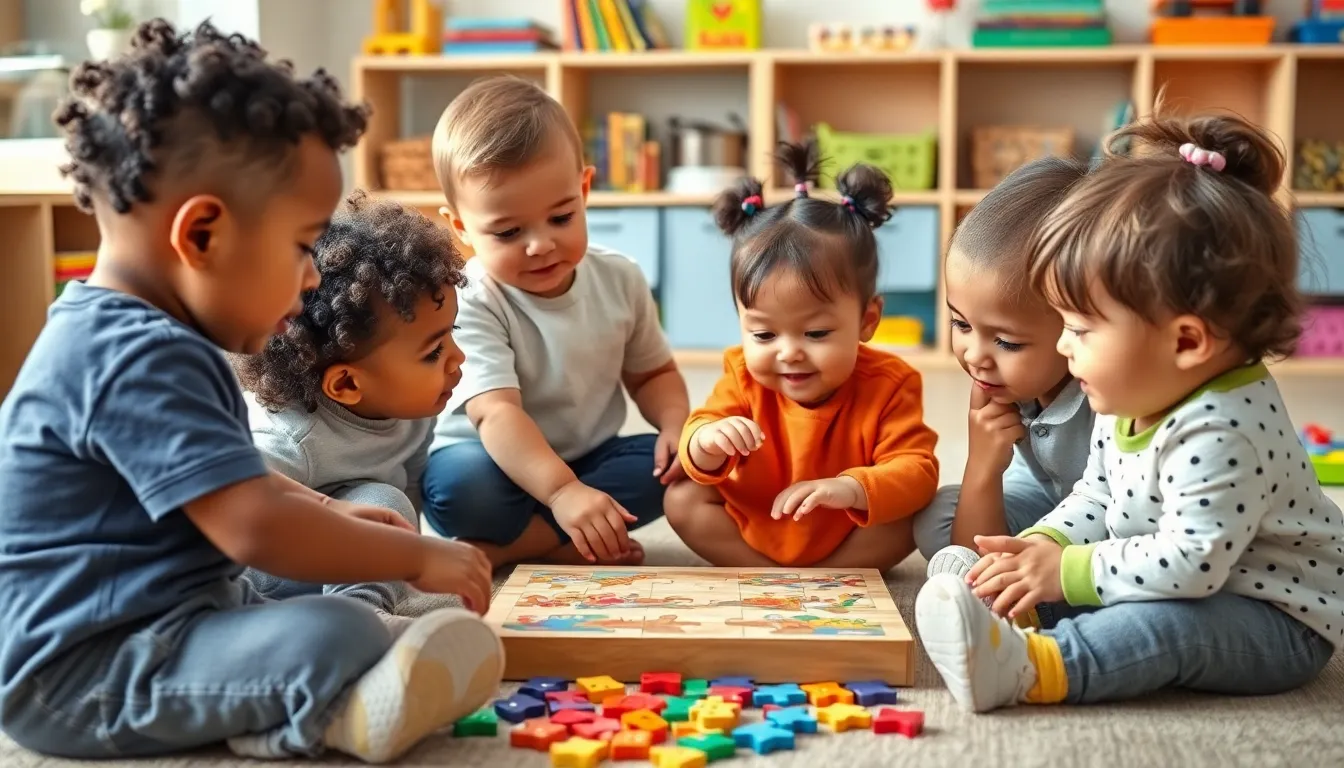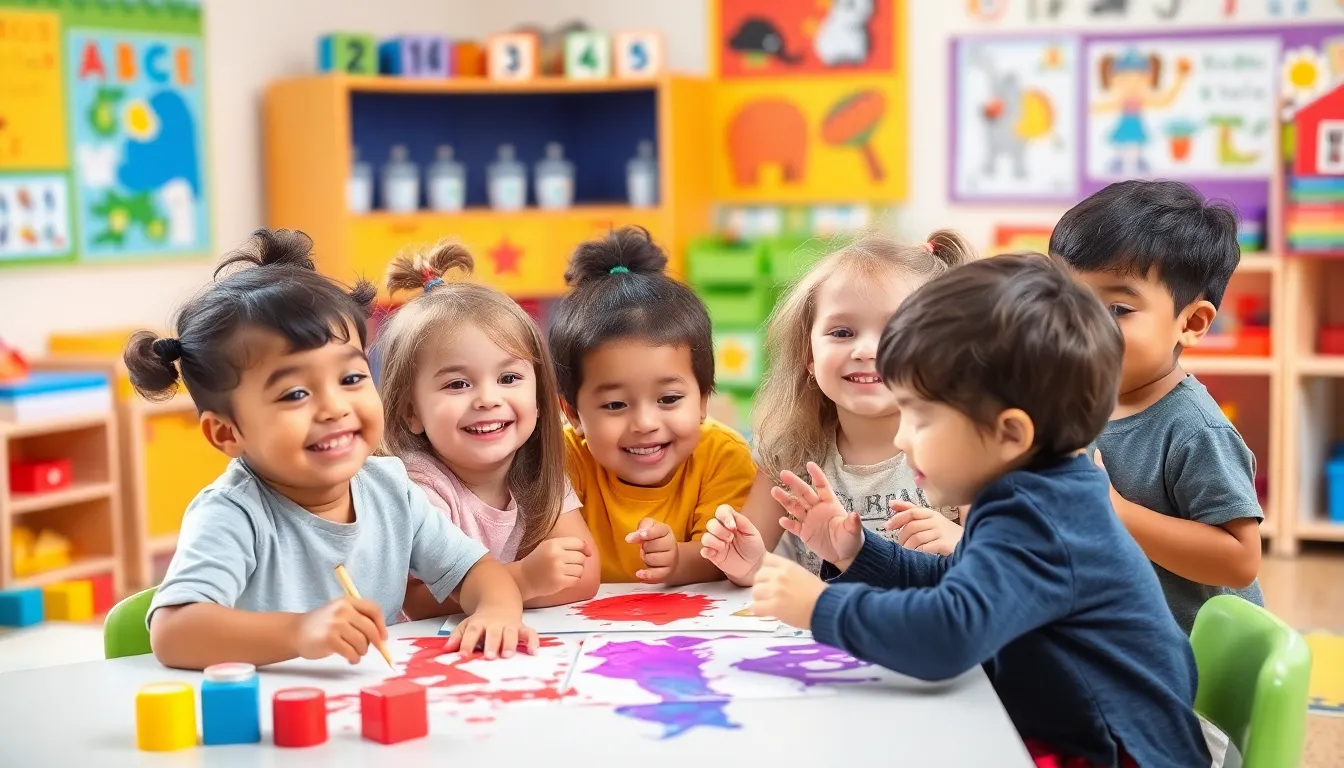In a world where toddlers wield crayons like tiny Picassos and turn snack time into a culinary masterpiece, early education isn’t just a luxury—it’s essential. These pint-sized explorers are naturally curious, and tapping into that curiosity can lay the foundation for lifelong learning. Imagine a classroom where finger painting is considered high art and counting blocks transforms into a thrilling adventure.
Table of Contents
ToggleImportance Of Toddler Early Education
Toddler early education significantly shapes a child’s development. Engaging activities during this critical period enhance cognitive skills and emotional growth. Participation in hands-on experiences, like arts and crafts or music, fosters creativity and problem-solving abilities.
Numerous studies indicate that early education increases school readiness. Children exposed to structured learning environments tend to perform better academically. Social skills also improve through peer interactions in educational settings. Cooperative play teaches sharing, communication, and teamwork, all vital for future success.
Creating a stimulating atmosphere is essential for maximizing these benefits. Effective classrooms encourage exploration and curiosity, laying the foundation for lifelong learning. Developmentally appropriate practices cater to individual needs and learning styles, ensuring that every child thrives.
Additionally, access to early education can lead to long-term advantages. Children who experience early learning opportunities often exhibit higher graduation rates. Economic prospects also improve as adults, as foundational skills lead to better job opportunities.
Investing in toddler early education yields significant returns for society. Communities benefit from a well-educated workforce, reduced crime rates, and lower social services costs. Enabling children to flourish paves the way for a brighter future for everyone.
Key Developmental Milestones

Key developmental milestones play an essential role in toddler early education, serving as benchmarks for a child’s growth and learning. Understanding these milestones allows educators and parents to support and encourage development effectively.
Cognitive Development
Cognitive development focuses on mental processes such as thinking, learning, and problem-solving. During this stage, toddlers engage with their environment through exploration, which sparks curiosity. Activities like puzzles, shape sorters, and interactive storytime enhance critical cognitive skills. It’s common for children aged 2 to 3 years to identify basic shapes and colors, showcasing their ability to understand and categorize information. As toddlers participate in these activities, they build the foundation for advanced reasoning and language skills.
Social and Emotional Growth
Social interactions and emotional understanding significantly shape a toddler’s growth. Through play, children learn to relate to peers and navigate their feelings. Sharing toys and taking turns fosters cooperation, while dramatic play allows toddlers to express emotions and understand empathy. By the age of 3, many children can identify basic emotions and respond to others’ feelings, indicating increased social awareness. Engaging in group activities enhances communication skills and cultivates friendships, promoting a supportive social network essential for emotional development.
Effective Early Education Strategies
Effective strategies enhance toddlers’ educational experiences. Engaging methods foster curiosity and support development.
Play-Based Learning
Play-based learning emphasizes exploration and creativity. In this approach, toddlers engage in activities like block building and sensory play, allowing them to learn through hands-on experiences. For example, exploring textures during sensory play helps enhance fine motor skills. Understanding concepts like numbers and letters becomes easier through playful interactions. Research shows that children participating in play-based settings develop critical thinking abilities and social skills. Such environments promote teamwork as toddlers collaborate on projects, nurturing their social and emotional competencies.
Structured Learning Environments
Structured learning environments balance freedom with guidance. In these settings, routines provide stability while engaging activities foster learning. Educators introduce focused lessons that align with developmental milestones, promoting cognitive growth. For instance, circle time allows for group discussions and story sharing, enhancing communication skills. Additionally, teachers tailor activities to accommodate various learning styles, ensuring each child benefits from the experience. Evidence suggests that children thrive in environments where structure and creativity coexist, leading to improved academic readiness and social interactions.
Role Of Parents And Caregivers
Parents and caregivers significantly influence a toddler’s early education. Their involvement creates a supportive environment that cultivates curiosity and learning.
Encouraging Learning At Home
Encouraging learning at home includes providing age-appropriate educational materials. Parents can introduce books that captivate a child’s interest. Engaging toddlers in everyday activities promotes learning; simple tasks, like cooking, introduce concepts such as counting and measuring. Encouragement can come from asking open-ended questions to stimulate critical thinking. Moreover, setting aside dedicated playtime offers opportunities for imaginative exploration. Parents can incorporate educational games that reinforce skills in a fun way. Consistency in reading and interactive storytelling nurtures language development.
Choosing The Right Educational Setting
Choosing the right educational setting influences a toddler’s growth. Research shows that structured environments balance freedom and guidance effectively. Parents should look for programs that emphasize play-based learning, which fosters creativity and critical thinking. Classrooms should also encourage interactive activities that promote social skills. Visits to potential educational settings allow parents to assess the atmosphere, routines, and curriculum. Additionally, a nurturing staff and an inviting environment lead to positive experiences. Observing the program in action helps parents understand how well it aligns with their child’s needs.
Challenges In Toddler Early Education
Toddler early education faces several challenges that can impact the effectiveness of learning experiences. Limited resources often hinder programs, making it difficult for educators to provide diverse materials and activities. Those constraints may lead to less engaging environments, reducing the overall potential of learning opportunities for children.
Classroom sizes also present an obstacle, as larger groups can make individualized attention difficult. When educators can’t focus on each child’s unique needs, the risk of stifling curiosity increases. Peer interactions, while beneficial, can sometimes lead to distractions that detract from learning experiences.
Additionally, varying developmental milestones among toddlers contribute to inconsistencies in the learning process. Every child grows at a different pace, which can create disparities in social and cognitive skill levels in group settings. Education strategies often require adaptability to meet these diverse needs, making it essential for educators to continually assess their approaches.
Furthermore, parental involvement plays a crucial role in early education. When parents disengage or lack knowledge about educational practices, it can create a barrier to fostering a collaborative environment. Engaging families in the educational process is vital for reinforcing skills learned in the classroom.
Finally, societal factors such as economic instability can impact access to quality early education experiences. Families facing financial stress may struggle to enroll their children in programs that provide comprehensive learning opportunities. Addressing these challenges requires a collaborative effort from communities, educators, and policymakers to prioritize effective solutions and ensure that all toddlers receive the education they deserve.
Toddler early education lays the foundation for lifelong learning and development. By fostering curiosity and creativity, it equips children with essential skills for academic and social success. A well-structured environment that balances play and guidance nurtures cognitive and emotional growth, ultimately shaping a child’s future.
Parents and caregivers play a vital role in this journey, encouraging exploration and engagement at home. As communities invest in quality early education, they pave the way for brighter prospects for all children. The benefits extend beyond individual growth, contributing to a more educated society and a stronger economy. Prioritizing toddler early education is an investment in a better future for everyone.




